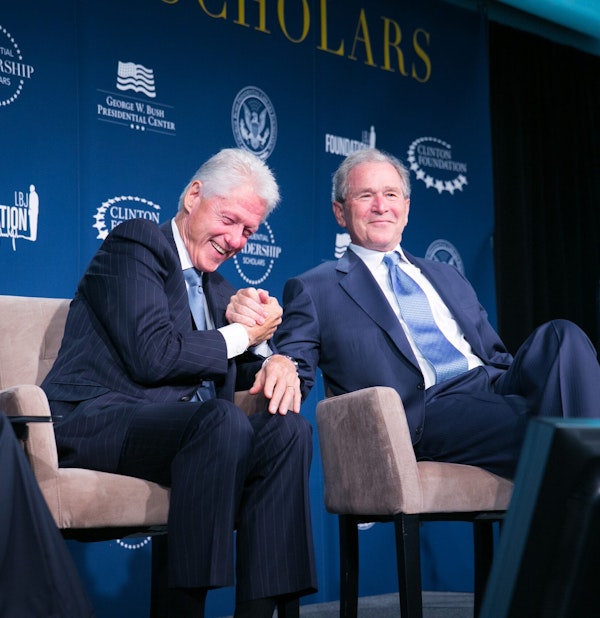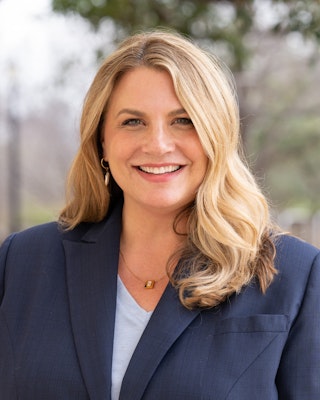Sparring for success
American-style diversity is messy, sometimes bruising – and essential to leadership and good governance
 Portrait of James Madison. (The White House)
Portrait of James Madison. (The White House)
Pluralism is often cited, rarely defined, and typically misunderstood. But strong leaders understand its utility – both for decision-making and for governing. Pluralism is a pragmatic tool, not a utopian destination or a partisan statement. It is the messy, sometimes bruising, central tenet of U.S. democracy – the idea that people of different beliefs, perspectives, and experiences can be citizens of the same country without going to war with one another. The best American leaders harness this idea to sharpen their decisions, build coalitions, and govern effectively.
Human nature
James Madison, the founding father and fourth president of the United States, was clear-eyed about how pluralism can help combat tyranny and protect individual liberty. Of course, the tyrant he was most concerned about was the king of England. But Madison, a student of history, also understood that unfettered majority rule could lead to its own kind of tyranny. The Roman mob represented consensus gone mad and had helped topple an empire.
Madison knew what other leaders and philosophers have recognized across the ages – and what modern research confirms. People are messy. Human nature contains both our better angels and our relentless self-interest. This idea shows up in the Bible in Ecclesiastes 7:20 as “Indeed, there is no one on earth who is righteous, no one who does what is right and never sins.” The Quran shares a similar sentiment in Sura Ash-Shams (91:7–10), acknowledging that each human has the capacity for both good and evil.
A recent study from the University of Chicago explores how self-interest and cooperation connect. It finds that people do regularly worry about being fair to others – but only after meeting their own needs.
“To survive, you have to care about yourself first. It doesn’t mean that you don’t care for others, but you have to survive first,” said Jean Decety, one of the study’s authors. In other words, people are often altruistic, but rarely at their own expense.
Madison understood that factions are inevitable and that majority rule which reflects the will of the people was generally a good thing. He also believed that the vastness of the American republic would prevent factions from accumulating enough size and power to compromise the rights of minority groups. The varying interests of different states and the jockeying of guilds and other groups would also help prevent a reckless majority from undermining individual liberties.
As Greg Weiner, the president of Assumption University, argues, Madison wanted the United States to have principled leaders, but he was realistic about human nature and the need for checks that could cool intemperate impulses. Creating a U.S. government with three branches provided one such check. A bicameral Congress provides another. Madison could not foresee certain developments, like the way the great speed of advanced communications technology has effectively shrunk the geographical size of the country, removing a tempering effect he counted on. But he understood that the United States could not rely solely on virtuousness of its people to survive, that it needed a system that accounted for human nature, and that pluralism was part of that solution.
 President Bill Clinton and President George W. Bush at the launch of the Presidential Leadership Scholars program on Sept. 8, 2014. (Flickr / Paul Morse)
President Bill Clinton and President George W. Bush at the launch of the Presidential Leadership Scholars program on Sept. 8, 2014. (Flickr / Paul Morse)
Teams of rivals
The way many people think of pluralism today has lost some of Madison’s gritty pragmatism. Pluralism is now often portrayed as a hazy idyll in which everyone just gets along – a smoothing out of our differences in a way that feels inauthentic.
Americans should continue to hold dear to the original, less pretty version of pluralism. Our vast, remarkable republic is filled with an enormous range of people who are not required to think or act the same. At the center of the Venn diagram of U.S. citizens is a shared commitment to liberty and freedom, but the rest of the circles are up for grabs. That means that we will bang into each other as we figure out how to build, sustain, and strengthen the United States. But that’s how the process was designed to work.
To ensure that it does, the country needs leaders – whether they are running a school, founding a business, serving on a city council or in Congress, leading a Fortune 500 company, or captaining a platoon – who understand pluralism properly and use it to help them navigate complexity. In the process, those leaders must be prepared to make hard decisions. Perhaps no American figure has understood this truth better than President Abraham Lincoln. While leading America through the existential crisis of the Civil War, Lincoln turned pluralism into management genius. By making his cabinet a team of rivals, as the historian Doris Kearns Goodwin called it, Lincoln turned enemies into allies and strengthened his own insights and decision making.
 Keith Hennessey at the 2025 Stand-To Veteran Leadership Program Module 1 on July 16, 2025. (Flickr / George W. Bush Presidential Center)
Keith Hennessey at the 2025 Stand-To Veteran Leadership Program Module 1 on July 16, 2025. (Flickr / George W. Bush Presidential Center)
Today, the United States once more needs leaders who do not fear discourse and dissent, but rather understand that such differences can improve governance. Ten years ago, to help foster such ideas, the presidential centers of George W. Bush, George H.W. Bush, Bill Clinton, and Lyndon B. Johnson launched the Presidential Leadership Scholars, a bipartisan program designed to help midcareer Americans deepen their leadership experience, refine their skills, and apply what they learn to real issues in real time. Each cohort of 60 Scholars represents the full range of U.S. political ideology, geography, and economic sectors. The program’s goal is not to celebrate difference in a kumbaya sort of way. Instead, the Scholars bring their perspectives, their experiences, and their expertise into the room for six months of learning about things like strategic partnerships, decision making, vision, and communication – in short, how to be effective leaders.
One of the exercises, led by faculty member Keith Hennessey, the David Rubenstein Fellow at the Bush Institute, aims to make pluralistic decision-making concrete. When Hennessey served as President George W. Bush’s Director of the White House National Economic Council, he was charged with coordinating the process to hash out very complicated economic policy questions before then bringing the options to the president. His goal was not to build consensus among the cabinet secretaries and experts involved, but to understand where everyone stood and why. Every year, Hennessey leads the Scholars through a simulation of that process. Each participant is assigned a role (secretary of homeland security, secretary of state, attorney general, etc.) and directed to weigh in on a hard policy issue. In one recent case, the exercise focused on immigration policy, and the Scholars had to grapple in real time with questions like who should get green cards, how to secure the border, and whom to deport (and why).
Hennessey has designed the process to underscore some of the basic realities of pluralistic leadership, including:
- Policymaking is hard.
- Advisors disagree.
- Serious, well-intentioned advisors can do good if they work hard and work well together in a structured process, even if they strongly disagree.
- There are multiple ways to make a decision or recommendation about a particular policy question.
- Advisors should aim to help the president do what is best for the country.
If pluralism is a bulwark against tyranny, it is also the iron that can sharpen decision making for our leaders. It helps them avoid groupthink and highlights risks that might otherwise be overlooked. It favors getting it right over getting along. In a pluralistic society, any policy will have winners and losers. That is part of the ongoing work of making the reality of America meet the promise of America. For nearly 250 years, U.S. prosperity and strength have been built on the core ideals of liberty and freedom. The country’s pluralistic people, pushing and pulling on that vision, are what bring the United States to life.
The Catalyst believes that ideas matter. We aim to stimulate debate on the most important issues of the day, featuring a range of arguments that are constructive, high-minded, and share our core values of freedom, opportunity, accountability, and compassion. To that end, we seek out ideas that may challenge us, and the authors’ views presented here are their own; The Catalyst does not endorse any particular policy, politician, or party.

